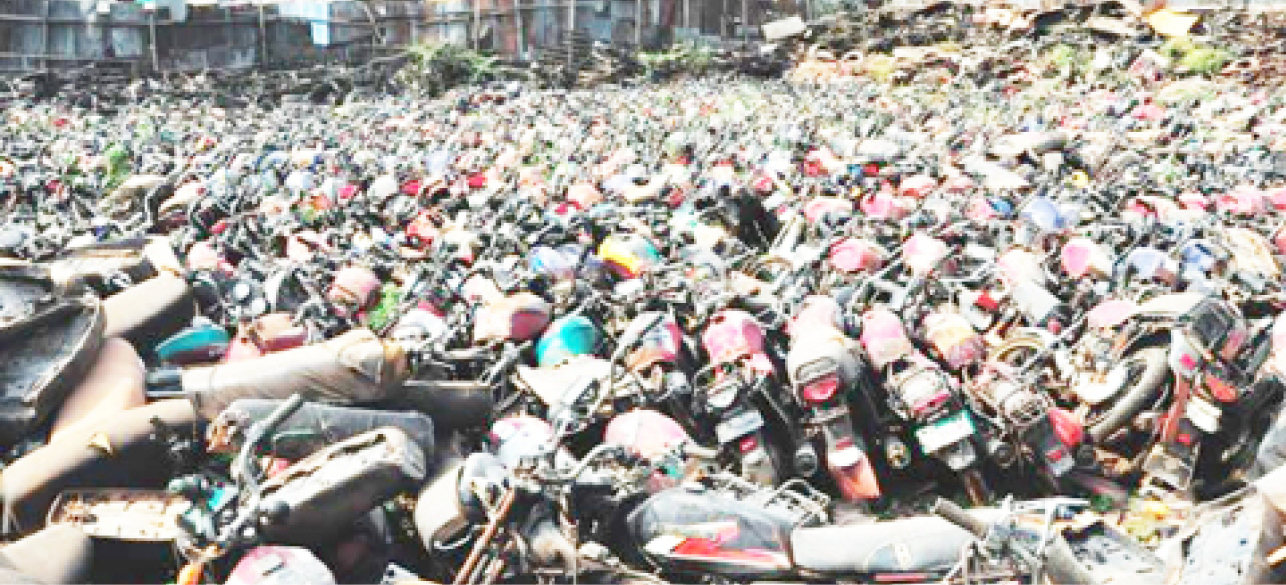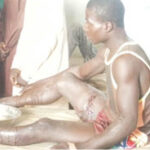Abdullateef Aliyu (Lagos), Zahraddeen Yakubu Shuaibu (Kano) & Seun Adeuyi
The ban and clampdowns on the operations of commercial motorcyclists (okada riders) in some parts of the country as measures to curb rising insecurity are aggravating the plights of the operators whose livelihoods depend on the business, Daily Trust on Sunday reports.
For instance, despite protests by commercial motorcyclists popularly known as Okada riders, it appears there is no going back on the total ban by the Lagos State Government even as it recently imposed a three-year jail term for both the riders and their passengers if arrested.
Prolonged strike: How state varsities are pulling out of ASUU struggle
Jos crisis: Meet men, women breaking ethno-religious barriers
The government announced this on Wednesday as the second phase of the Okada ban started on September 1 in four more local governments (LGs) and six local council development areas (LCDAs).
The councils are Kosofe, Oshodi-Isolo, Somolu and Mushin while the six Local Council Development Areas are Ikosi-Isheri, Agboyi-Ketu, Isolo, Bariga, Odi-Olowo and Ejigbo.
It would be recalled that Okada operation was earlier banned in June starting with six LGs of Ikeja, Surulere, Eti-Osa, Lagos Mainland, Lagos Island and Apapa with their respective nine LCDAs and all major bridges and highways in the state.
The development has seen the riders grumbling that their means of livelihood would be grossly affected.
Okada riders in Lagos under the aegis of Members of Motorcycle Operators Association of Lagos State (MOALS) said 10 million youths would be thrown into the labour market as a result of the ban.
One of the riders, Adeleke Adegboyega, from Kosofe said with the latest ban, more than 20,000 Okada riders would be affected in his zone alone, adding that on the average, an operator had a minimum of 10 family members to cater for, wondering what would become their fate.
He said, “We are pleading with the government to have a rethink on the ban, those who are doing legitimate business would not commit crimes, we are not criminals.
“Government should not allow people to go into crime. If you insist that we should stop doing our business, people would go into crime.
“Crimes are not committed alone with Okada. Look at the issue of train attack in Kaduna, they were not committed by those who are legitimately engaged in Okada business.
“I beg the government to see what it can do. On our part, we are doing our best to sanitize our members. The situation is not good now to impose ban on Okada business in the state.”
Comrade Azeez Ayorinde, Chairman of MOALS, Zone H, reiterated that banning Okada in the state would have a ripple effect.
According to him, it is not only the riders that will be affected, those who deal in spare parts, the mechanics, the food sellers, among others would also suffer for lack of patronages, adding: “There is no employment anywhere now.”
“Those who are into Okada business went into it because there is no other business for them,” he added, while appealing to the Governor Babajide Sanwo-Olu to reconsider his stance.
“We know ourselves. We are not criminals. I have my children in school, if they stop Okada business, my children will stop schooling. I don’t want my children to turn to labourers,” he said.
He said they came on a peaceful protest because no leader at the top hierarchy of the union was ready to speak for them and let the government know the problems they were passing through.
A leader of MOALS, Comrade Abiodun Ibrahim, covering Mile 2 down to Ibeju-Lekki, said given the systematic approach adopted by the state government on the ban, there are indications the ban would extend to the nooks and crannies of Lagos by December this year.
According to him, this would breed more idle hands in the state.
“We have graduates among us here. If any child is abandoned, what would happen? Okada is not the only thing that is being used to commit crimes,” he said.
Restriction on tricycles despite Okada ban in Kano
In Kano, the state government banned Okada riders in 2012 over the rising security challenges posed by the Boko Haram terrorists at the time. Since then, tricycles have replaced motorcycles as a means of local transportation within the state metropolis.
Although the tricycles were introduced during the time of Malam Ibrahim Shekarau as governor of the state in 2005, they were not widely accepted until after the ban of Okada. Since then, the tricycles have taken over most of the commercial means of transportation, including the taxis and buses.
Thousands of youths earn a living through the business with the registered number of tricycles in operation put above 70,000.
However, on July 21, the state government restricted the movement of tricycles from 10pm over alleged criminal activities aided by some of the riders, especially at night.
A statement issued by the state commissioner of information, Malam Muhammad Garba, indicated that the decision to that effect was reached at the end of the state security meeting, and that the measure was part of an effort to ensure the security of lives and property in the state.
But, some of the tricycle riders interviewed expressed divergent views over the development, with some saying the decision has yielded a positive outcome, as it is helping to remove the criminals among them, while others argued that as alternatives were not provided for them, they had to shift their working time to avoid sanctions as they have to pay N15,000 whenever they are arrested.
A tricycle rider, Jamilu Muhammad Shehu, said the restrictions has played a significant role in tackling criminal activities as the number of phone snatching and attacks has reduced drastically.
“Honestly speaking, the decision is making a positive impact as far as the security challenges are concerned. The rate of criminal activities, aided through tricycles has reduced by almost 90 per cent. The crimes are committed in the night and most of them are using tricycles.”
According to him, he operates within working hours and usually closes at 9pm in the event he works in the night.
Meanwhile for Aminu Hudu, another tricycle rider, the restriction has forced him to change his schedules from working in the night to day time, and it has reduced his earnings.
“You know different people work with a single tricycle. In my own case, three of us use it. The first person works from morning to afternoon, the second from afternoon to evening, while I work in the night. I normally start from 10pm to 1am, sometimes to 2am. But now, I have to stop.
“Just like me, other people are also facing this kind of challenge. Some have even lost their business because the tricycle is not their own; they hire it. With the ban now, they can’t operate in the night. So, these are some of the challenges we are facing,” he said.
Others interviewed said the development has brought positive changes towards cubbing criminal activities, but at the same time affected residents who conduct their businesses after 10pm as they find it difficult to get back to their houses.
“Because we rely on tricycles as means of transportation, we find it difficult to get to our houses on time following the restrictions. But that has given chances to taxis and buses to operate within that period. But surely, it has reduced the rate of criminal activities,” a resident, Musa Ibrahim, said.
Speaking on the impact of the restrictions in curbing criminal offenses, the Public Relations Officer of the Kano State Road and Traffic Agency (KAROTA), Nabulisi Abubakar Kofar Na’isa, said they recorded only three criminal activities related to tricycle within the six weeks that the restriction has commenced.
He said the tricycle riders also expressed satisfaction with the development as the criminals disguising among them have been wiped out of the business.
“Before this restriction, we usually record criminal activities everyday and all are carried out using tricycles. But since after the restrictions, we’ve only recorded three in the period of six weeks. So, we are satisfied and it’s making a positive impact,” he said.
Commuters lament lack of alternative in Abuja
In the Federal Capital Territory (FCT), city centre in particular, commercial motorcycles, which is popularly known as Okada was first banned when Malam Nasiru El-Rufai was the minister, and the ban is still binding till date. However, it is prevalent on some Abuja’s highways.
The riders still take passengers to areas not easily accessible by vehicles like Daki Biyu near Jabo Park, villages at the back of Gwarinpa, Asokoro and other locations like Kubwa, Dutse, among others.
In separate interviews with Daily Trust Saturday, many FCT residents expressed divergent views on the operations of Okada riders within the city centre.
Mrs Ikechukwu Ruth, a civil servant, said: “Okada is a means of livelihood to many, a reliable and affordable means of transportation that should be maintained, especially for low-income earners trying to eke out a living in the FCT.”
She argued that the advantages of their operation far outweigh the disadvantages.
“No matter what, the advantages of having commercial motorcycles in the city centre are many. I do not have a car, so I have to use Okada, as it is easy and affordable.
“There are areas one cannot access except with cabs; which are usually very expensive. Commercial motorcycles are able to meander through heavy traffic and drop you at your destination on time and at relatively low cost,” Ruth said.
Another civil servant, Ibrahim Mohammed, said despite the arguable advantages of having commercial motorcycles operating within the cities, “a ride in an Okada is a ride to death as many of them engage in reckless driving and would not use crash helmets; thereby putting their passengers and other road users at risk despite efforts to sensitise them.”
He said: “If you don’t know, more than 90 per cent of the Okada rides are suicide-prone. It’s just the plain truth. They throw caution to the wind and seem to be in a hurry to get to hell.”
“I know of a company that organises seminars for them on several occasions in collaboration with the Local Okada Riders Association. On several occasions, free crash helmets were handed over to them, but check them a few days after and you won’t see them wearing the helmets. Isn’t that strange?
“They prefer death to taking precautions. Go to most hospitals and you will see a lot of Okada accident victims in their so-called Okada wards.
“The way the guys ride their bikes makes one wonder if they are sane. Just imagine an Okada riding in front of your car at a certain speed and all of a sudden, the rider makes a U-turn to the other side of the road, because a passenger had beckoned to him. I know that car drivers do the same, but the Okada riders are more exposed to risk than the motorists.”

 Join Daily Trust WhatsApp Community For Quick Access To News and Happenings Around You.
Join Daily Trust WhatsApp Community For Quick Access To News and Happenings Around You.


